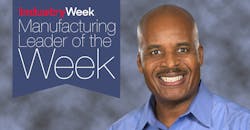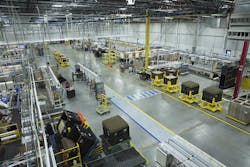Whirlpool’s Green Takes Aim at World Class Manufacturing
Whirlpool Corp. (IW 500/54) has a been a leader in the appliance industry for more than 100 years, Byron Green observes, but to keep that position, it needs to continuously improve. That’ why Green, the vice president of manufacturing for Whirlpool’s 14 factories in the U.S. and Mexico, is intent on Manufacturing 2020, the company’s program to reinvigorate its manufacturing operations.
“Manufacturing 2020 is what we call our global strategy, which we've put in place to ensure our leadership position,” he explains. “It includes actions like fortifying our production system, standardizing our manufacturing-organization structure, integrating advanced technologies, and continuously improving to ensure we're competitive in every region of the world.”
Whirlpool has had a lean production system for a number of years but the company has joined the World Class Manufacturing Association as part of its commitment to become a global leader in manufacturing. It will be a multi-year journey, Green noted, saying that manufacturing was littered with companies that saw lean as a collection of tools that could be deployed for a quick win. Successful companies, he said, instead see it as a bedrock of their culture.
“When there is a problem to be solved, as there always is in manufacturing, that is the move,” he said. “You’re absolutely 100% dedicated to continuous improvement and the root cause problem-solving tools that are there.”
The advantage of joining a consortium of different manufacturers like WCMA, Green said, is that it provides a common language about manufacturing principles for companies and has an auditing system that will assure “we’ve got the rigor and discipline moving forward.”
Green, an electrical engineer with a master’s degree in Engineering Management/Control Systems, joined Whirlpool in January 2017. He previously was a vice president and head of Vehicle Assembly at Fiat Chrysler. Since joining Whirlpool, he has been taking the message to Whirlpool plants not just through phone calls, emails and online tools but with constant travel. “I have to be on the floor and present, and talking about the strategic things that we want to do to move forward,” he said.
Green said a key difference between the former Whirlpool Production System and the new WCMA system is a greater focus on engaging employees in improvement. “The input comes from the bottom to the top versus the top down,” he says. Whirlpool wants to create workplaces where employees are safe, focused on achieving business goals and feel that they are working at a place where they “want to work.” To help measure employee engagement, Whirlpool has implemented an active suggestion system.
“We have a base of some 20,000 employees working for us every single day. That workforce has a tremendous number of ideas. We need to capture them and really react to them,” he told IndustryWeek.
Green said not acting on employee suggestions is a “tremendous demotivator” and a “failure of leadership.” He said manufacturing leaders have to become more like teachers, taking information from employees and working on problem-solving.
Despite all the technology changes in manufacturing, Green said “people are what really makes the whole system go.” He noted that team leaders in the plants are key to changing the culture and achieving the company’s goals.
“My job is to be an ambassador and to make sure they understand that they are the most important forces in our operations,” he said. “I need them to let us know what the problems are so we can work to solve those problems together.”
“Manufacturing really is an honest occupation because you’re measured every single minute, every single hour,” said Green. “If you’re not continuously improving, somebody is going to catch you – your competitors.”
Whirlpool also has a plank in its Manufacturing 2020 program concerning disruptive technology. Manufacturers are facing an unprecedented deluge of new technologies from 3D printing to business analytics designed to make companies more efficient and open new business opportunities. Whirlpool’s manufacturing engineering group is tasked with evaluating these technologies and, says Green, asking a fundamental question: “How does this fit into our strategic path for production in the future?”
Whirlpool’s plant in Cleveland, Tenn., serves as a pilot plant for many of these new technologies. For example, Green said, Whirlpool has gone from zero collaborative robots two years ago to having 65 “working hand in hand with humans on our shop floor.”
Every plant should have "order and cleanliness," says Whirlpool's Byron Green. That is evident in the Findlay, Ohio, plant where 2,300 employees produce dishwashers.
Unlike past robot installations that were hugely expensive, difficult to move and required separation from employees for safety reasons, these new robots facilitate more agile manufacturing while freeing employees from doing repetitive operations. Green says that doesn’t displace workers but rather frees them to take on new production tasks such as programming robots. As the shop floor moves up in its level of technology, Green said, so will the tasks for assembly workers.
Manufacturing on the Rise
“I have always viewed a country’s manufacturing base as an indicator of its overall strength,” said Green. He noted that many Americans view U.S. manufacturing as lacking strength and falling behind some other nations in terms of innovation and efficiency. He disagrees, arguing that U.S. manufacturers have made huge improvements in productivity, quality and innovation since the Great Recession.
Still, Green says the industry faces some major challenges. The first is “attracting and retaining talent, young talent – particularly STEM talent,” he said. Manufacturing is seen as second or third choice for a career compared to some service companies such as Google. But Green says manufacturers are using the same technologies as in the service sector and need to be “better advocates” for positioning manufacturing careers as on par with other sectors.
Whirlpool was a gold sponsor of Manufacturing Day and all of its facilities participated with events for students and teachers. In 2016, more than 3,500 people came to Whirlpool events.
Green said manufacturers need to be active in the schools, engaging with young people even at the elementary school level and letting them know that manufacturing offers an exciting career path.
“In order for us to remain viable in the future, we can't have a talent drain,” he stressed.
Green also notes efforts by Whirlpool and other manufacturers to reestablish and strengthen the pipelines for manufacturing employees through vocational schools, two-year college programs and apprentice training.
Once those young people enter the manufacturing industry, Green continued, they need to be provided a more flexible work environment that recognizes the need for a healthy work-life balance. He said technology can be used in that effort to, for example, allow employees to work remotely where appropriate. He said it also was important for companies to provide manufacturing employees with a career path rather than expect to hire people and then have them do the same job for 10 years.
“No talent is going to accept that,” he says. “They just won’t.”
Green also makes it clear that Whirlpool won’t accept second-class status in the appliance industry and sees improvements in its manufacturing operations as an important step toward maintaining a leadership role against strong competition from companies such as Samsung and LG.
“The burning platform for us is that we've been a leader for 106 years,” he says, “and we want to remain a leader for the next 106 years and beyond.”
About the Author
Steve Minter Blog
Executive Editor
Focus: Global Economy & International Trade
Email: [email protected]
Follow on Twitter: @SgMinterIW
Call: 216-931-9281
An award-winning editor, Executive Editor Steve Minter covers global economic and international trade issues, tackling subject matter ranging from manufacturing trends, public policy and regulations in developed and emerging markets to global regulation and currency exchange rates. As well, he supervises content production of all IW editorial products including the magazine, IndustryWeek.com, research and informationproducts, and executive conferences.
Before joining the IW staff, Steve was publisher and editorial director of Penton Media’s EHS Today, where he was instrumental in the development of the Champions of Safety and America’s Safest Companies recognition programs.
Steve received his B.A. in English from Oberlin College. He is married and has two children.

